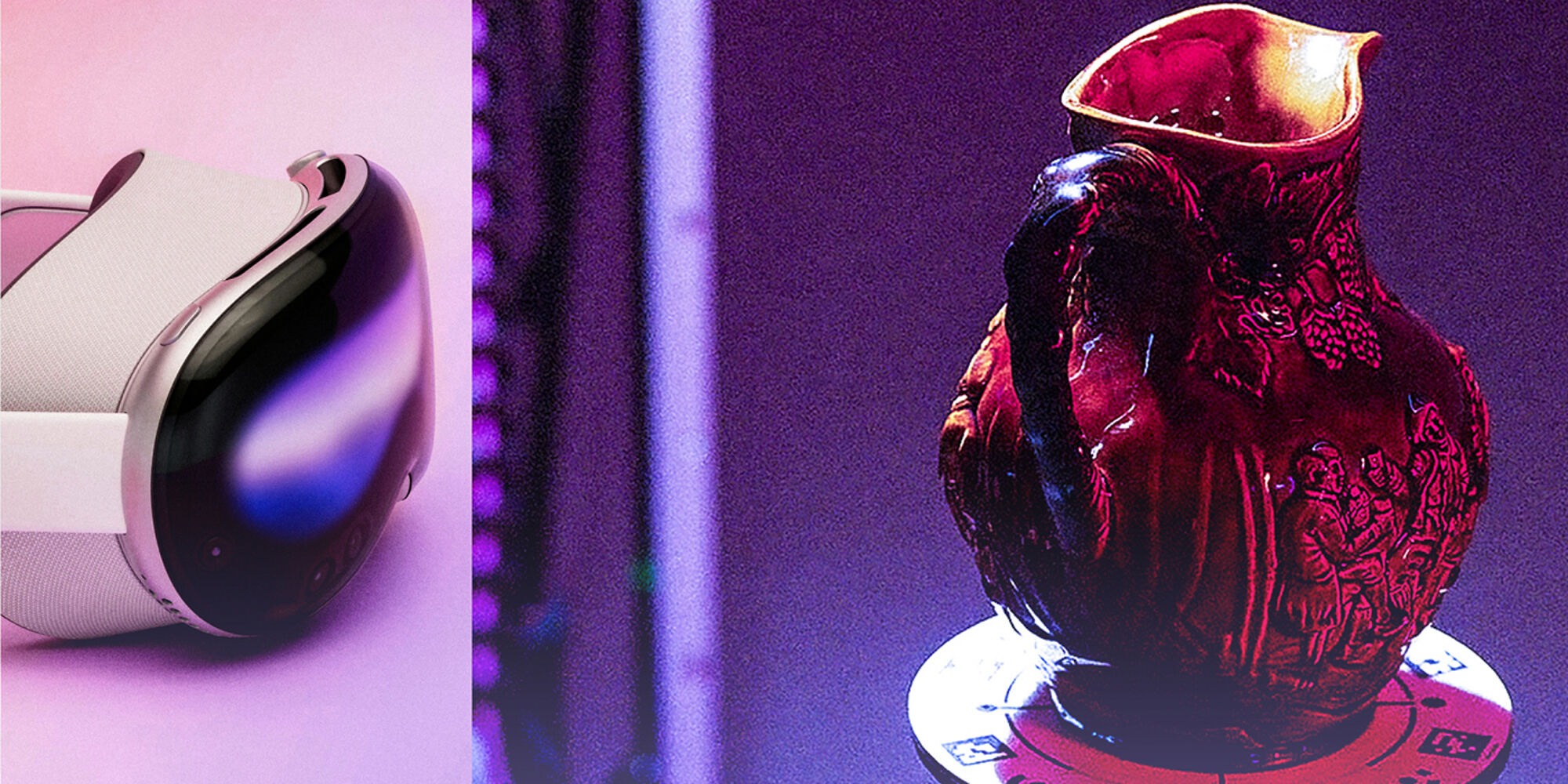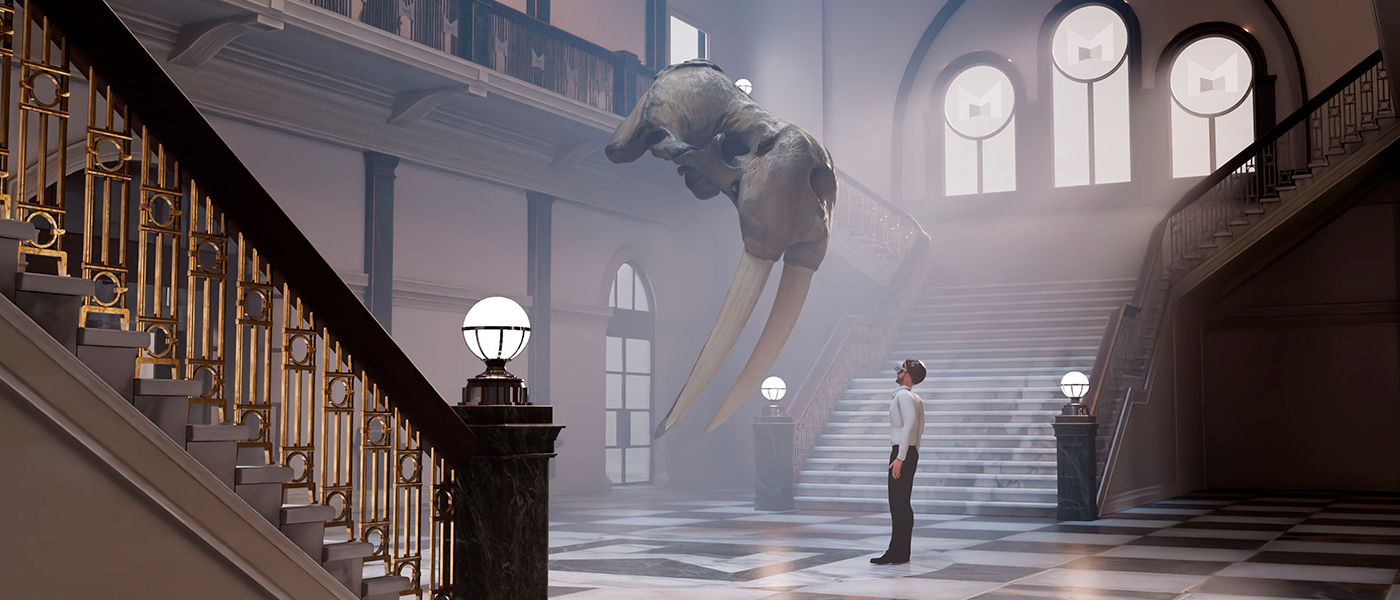University of Glasgow

Museums in the Metaverse
We're putting museums in the Metaverse so barriers become a thing of the past
By Áine Allardyce
What if you could create the museum of your dreams, filled with treasures usually hidden from public view? Imagine holding a Goliath Beetle in the palm of your hand, coming face-to-face with Mary Queen of Scots’ death mask, or examining an enormous walrus skull from every angle – all from the comfort of your living room. That’s the reality of Museums in the Metaverse (MiM), the University’s pioneering platform that hopes to help transform how we experience cultural heritage and allows visitors to become curators of their own digital collections.
Just over a year after its £5.6 million launch through the UK Government’s Innovation Accelerator programme, led by Innovate UK on behalf of UK Research and Innovation, the project has already achieved significant milestones. Six unique virtual environments have been completed – including a meticulously recreated Victorian laboratory inspired by the University’s Gilbert Scott Building.
The Museums in the Metaverse team, led by Professor of Philosophy & Extended Reality (XR) Technology Neil McDonnell, includes Dr Pauline Mackay, Professor Murray Pittock and Professor Maria Economou.

Render of Museums in the Metaverse environment with walrus skull. This 1758 skull, which has tusks and teeth but no lower jaw, is in The Hunterian's collections.
"Virtual museums won’t replace the experience of visiting a traditional museum," says Professor McDonnell, "but I hope this new XR platform and experience will enhance the offering of traditional museums."
"Through the power of XR technology, we’re not just making museum cultural treasures accessible; we’re reimagining how they can be experienced. From remote corners of the world to the comfort of home, people can now engage with objects like never before – touching, inspecting and learning in ways that break down traditional barriers.” – Professor Neil McDonnell
The platform offers two distinct experiences: visitors can explore pre-curated virtual museums, or become curators themselves, designing their own exhibitions from an ever-growing collection of digital artifacts. Visitor mode testing is already underway, with the curator mode set to begin trials in early 2025.
Meticulous digital skill
Working with technical partner Edify, the project has been digitising 300 artifacts from the University’s cultural heritage partners National Museums Scotland, Historic Environment Scotland, and our own Hunterian Museum. Each object undergoes an intricate transformation: hundreds of photographs are stitched together through photogrammetry to create detailed 3D models, which are then enhanced by skilled digital artists.
Dr Pauline Mackay, Co-Investigator on MiM, who is co-leading the museology strand of the project, is clear that it has the potential to revolutionise access to museums worldwide. “This project is a game-changer for cultural heritage," she says, "especially for those who might otherwise never get the chance to interact with museum collections."
"It’s not just about viewing artifacts, it’s about fostering a deeper connection, enabling people of all ages and abilities to engage with history in a meaningful, hands-on way.” – Dr Pauline Mackay
Bringing historical artifacts up close
MiM addresses a long-standing challenge in museum curation: globally, less than 10% of museum collections are typically on public display. Objects may be too fragile, light-sensitive, or valuable for regular exhibition. Virtual reality removes these barriers, allowing visitors to examine even the most delicate artifacts up close or pick them up and make them larger to see finer details on objects like snuff boxes or chess pieces.
Looking ahead, MiM hopes to reshape how museums engage with their audiences globally. The platform’s first major curated experience was launched in December 2024 to coincide with Lord Kelvin’s bicentenary celebrations and features 11 rarely seen objects in a meticulously recreated Victorian laboratory environment. This showcase demonstrates how virtual reality can bring historic spaces to life while making previously inaccessible collections available to everyone.
World-leading expertise
Bringing these experiences to life hasn’t been simple. Creating museum experiences in the metaverse has historically been prohibitively expensive. However, the University's world-leading expertise in digital cultural heritage and XR technology, combined with cutting-edge photogrammetry equipment, is making these immersive experiences more accessible and affordable than ever before.
Among the treasures already digitised are iconic artifacts like the Lewis chess pieces. Each can be examined from any angle, enlarged for detailed study, or incorporated into personalised exhibitions that would be impossible in the physical world.
As MiM prepares for its public launch in April 2025, it represents more than just technological innovation – it’s a glimpse into the future of cultural preservation and accessibility.
Find out more
- Professor Neil McDonnell
- Dr Pauline Mackay
- Professor Murray Pittock
- Professor Maria Economou
- Museums in the Metaverse
- National Museums Scotland
- Historic Environment Scotland
- The Hunterian Museum
Main image of the Museums in the Metaverse team, pictured in The Hunterian Museum: Martin Shields
Walrus image, below left: courtesy of The Hunterian
Click to watch BBC historian Lucy Worsley experiencing the MiM technology first-hand. She said: “You can handle and get close to things that you just wouldn’t be able to in real life because they’d be too precious or they’d be in storage. It’s a different way of accessing the real thing.” (video courtesy Lucy Worsley/Meta)

